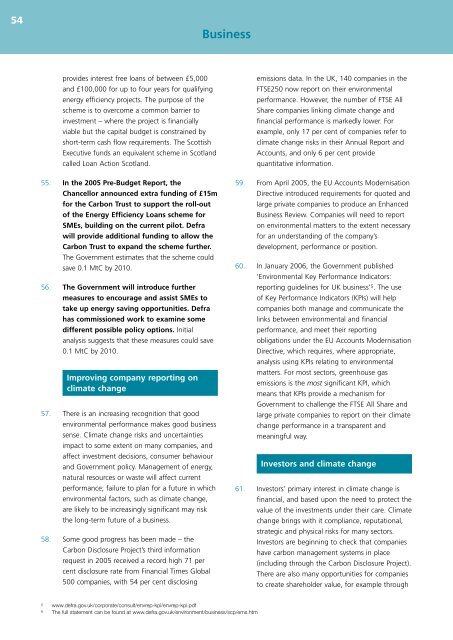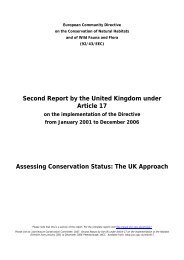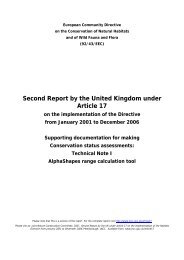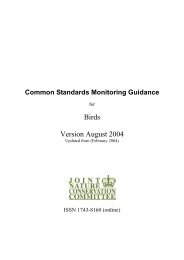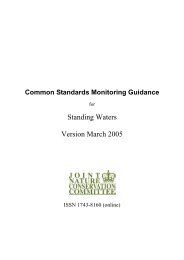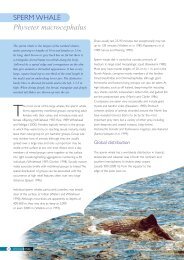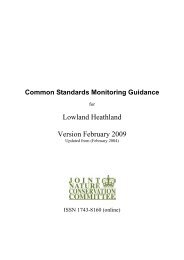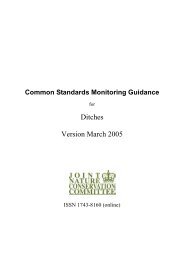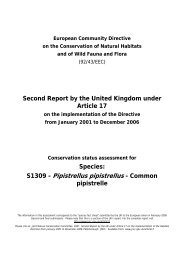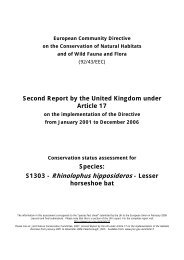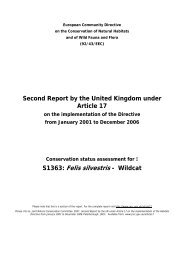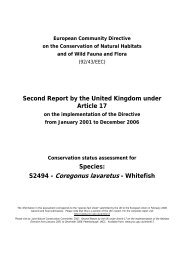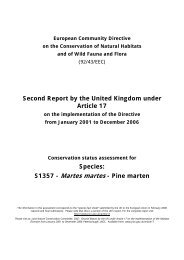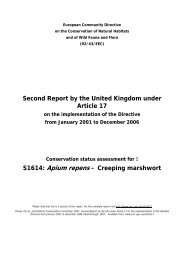UK Climate Change Programme 2006 - JNCC - Defra
UK Climate Change Programme 2006 - JNCC - Defra
UK Climate Change Programme 2006 - JNCC - Defra
You also want an ePaper? Increase the reach of your titles
YUMPU automatically turns print PDFs into web optimized ePapers that Google loves.
54<br />
Business<br />
provides interest free loans of between £5,000<br />
and £100,000 for up to four years for qualifying<br />
energy efficiency projects. The purpose of the<br />
scheme is to overcome a common barrier to<br />
investment – where the project is financially<br />
viable but the capital budget is constrained by<br />
short-term cash flow requirements. The Scottish<br />
Executive funds an equivalent scheme in Scotland<br />
called Loan Action Scotland.<br />
55. In the 2005 Pre-Budget Report, the<br />
Chancellor announced extra funding of £15m<br />
for the Carbon Trust to support the roll-out<br />
of the Energy Efficiency Loans scheme for<br />
SMEs, building on the current pilot. <strong>Defra</strong><br />
will provide additional funding to allow the<br />
Carbon Trust to expand the scheme further.<br />
The Government estimates that the scheme could<br />
save 0.1 MtC by 2010.<br />
56. The Government will introduce further<br />
measures to encourage and assist SMEs to<br />
take up energy saving opportunities. <strong>Defra</strong><br />
has commissioned work to examine some<br />
different possible policy options. Initial<br />
analysis suggests that these measures could save<br />
0.1 MtC by 2010.<br />
Improving company reporting on<br />
climate change<br />
57. There is an increasing recognition that good<br />
environmental performance makes good business<br />
sense. <strong>Climate</strong> change risks and uncertainties<br />
impact to some extent on many companies, and<br />
affect investment decisions, consumer behaviour<br />
and Government policy. Management of energy,<br />
natural resources or waste will affect current<br />
performance; failure to plan for a future in which<br />
environmental factors, such as climate change,<br />
are likely to be increasingly significant may risk<br />
the long-term future of a business.<br />
58. Some good progress has been made – the<br />
Carbon Disclosure Project’s third information<br />
request in 2005 received a record high 71 per<br />
cent disclosure rate from Financial Times Global<br />
500 companies, with 54 per cent disclosing<br />
emissions data. In the <strong>UK</strong>, 140 companies in the<br />
FTSE250 now report on their environmental<br />
performance. However, the number of FTSE All<br />
Share companies linking climate change and<br />
financial performance is markedly lower. For<br />
example, only 17 per cent of companies refer to<br />
climate change risks in their Annual Report and<br />
Accounts, and only 6 per cent provide<br />
quantitative information.<br />
59. From April 2005, the EU Accounts Modernisation<br />
Directive introduced requirements for quoted and<br />
large private companies to produce an Enhanced<br />
Business Review. Companies will need to report<br />
on environmental matters to the extent necessary<br />
for an understanding of the company’s<br />
development, performance or position.<br />
60. In January <strong>2006</strong>, the Government published<br />
‘Environmental Key Performance Indicators:<br />
reporting guidelines for <strong>UK</strong> business’ 5 . The use<br />
of Key Performance Indicators (KPIs) will help<br />
companies both manage and communicate the<br />
links between environmental and financial<br />
performance, and meet their reporting<br />
obligations under the EU Accounts Modernisation<br />
Directive, which requires, where appropriate,<br />
analysis using KPIs relating to environmental<br />
matters. For most sectors, greenhouse gas<br />
emissions is the most significant KPI, which<br />
means that KPIs provide a mechanism for<br />
Government to challenge the FTSE All Share and<br />
large private companies to report on their climate<br />
change performance in a transparent and<br />
meaningful way.<br />
Investors and climate change<br />
61. Investors’ primary interest in climate change is<br />
financial, and based upon the need to protect the<br />
value of the investments under their care. <strong>Climate</strong><br />
change brings with it compliance, reputational,<br />
strategic and physical risks for many sectors.<br />
Investors are beginning to check that companies<br />
have carbon management systems in place<br />
(including through the Carbon Disclosure Project).<br />
There are also many opportunities for companies<br />
to create shareholder value, for example through<br />
5 www.defra.gov.uk/corporate/consult/envrep-kpi/envrep-kpi.pdf<br />
6 The full statement can be found at www.defra.gov.uk/environment/business/scp/ems.htm


